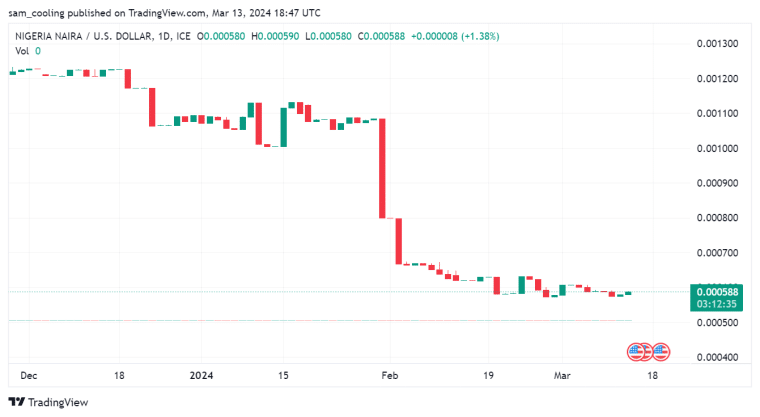The strange ongoing tussle between Binance, the world’s leading cryptocurrency exchange in terms of trading volume, and the Nigerian government is intensifying after Binance Executives were arrested for allegedly destabilizing the national currency, the naira.
For years, Nigerians have used cryptocurrencies as a safe haven from the unstable naira and to get around laws intended to support the currency. The technology has helped save purchasing power for many Nigerians as the naira’s inflation rate continues to rise, reaching 29.9% in January.

Crypto Is Doing What It Does Best
One of the main benefits of cryptocurrency is the chance to get away from very unstable currencies like the naira or the Argentinian peso. Instead of being stuck with local currencies that lose value significantly each month due to government actions, people can use USD stablecoins (or other cryptocurrencies) and improve their financial situation. However, this move might be making the local currencies even weaker, as individuals sell their naira or pesos for USD stablecoins on the black market at rates lower than the official exchange rates.
Why Binance?
The Nigerian government is trying to fight back against the influence that cryptocurrencies are gaining in the country, and Binance has become a top target. This is because Binance is used to purchase cryptos and to check the black market exchange rate with USD stablecoins (which, naturally, is much lower than the government’s rate).
At the heart of the conflict is Nigeria’s request for Binance to disclose information about its top 100 users in the country and provide a comprehensive transaction history spanning the last six months. The government claims that Binance is being used to manipulate the naira, even though the evidence shows that it’s likely just regular people trying to retain purchasing power by selling their naira for a (more) stable currency.
This demand aligns with broader efforts to stabilize the national currency and exert control over the crypto market within Nigerian borders – a real challenge as the Nigerian crypto market remains one of the largest and fastest growing in the world.
The Detention Drama: A Closer Look At Binance Executive’s Arrest
The situation escalated when two Binance executives were detained in Nigeria, marking a dramatic turn in the country’s standoff with the crypto exchange.
Meet the two Binance executives detained in Nigeria.
Tigran Gambaryan, Binance’s head of investigations, and Nadeem Anjarwalla, manager for Binance Africa. pic.twitter.com/umkWUo6suK
— Naija (@Naija_PR) March 13, 2024
The executives, key figures in the exchange’s Africa operations, have been held without formal charges, prompting international concern and raising questions about the intersection of cryptocurrency regulation and diplomatic relations.
The arrests have become marred in controversy with allegations that the arrested executives were ‘set up’. According to the Wall Street Journal’s report, Tigran Gambaryan, Binance’s Head of Investigations, thought that he was going on a short business trip to meet with central bank authorities, but there was no meeting. He was arrested along with his colleague, Nadeem Anjarwalla, the manager of Binance Africa.
This incident underscores the complexities and potential tensions in regulating the globalized, decentralized world of cryptocurrency – especially on the back of Nigeria’s recent decision to block Nigerian internet connections to multiple crypto exchanges.
Read: How to Buy Bitcoin in Nigeria
Yet, the Binance-Nigeria saga isn’t just a bilateral issue; it has broader implications for the global cryptocurrency ecosystem.
As governments worldwide grapple with how to regulate cryptocurrencies, the outcome of this confrontation could set precedents affecting how other nations approach crypto regulation, especially concerning user data privacy and exchange-government cooperation.
The Bottom Line: What Lies Ahead?
As the situation unfolds, the crypto community is watching closely – the balance Nigeria seeks to strike between economic stability and the burgeoning crypto market could influence future regulatory frameworks in other nations – especially across Africa. It will be vital to continue to push for the ability for everyone to access the safehaven that is cryptocurrency.
Moreover, the resolution of this dispute might offer insights into how crypto exchanges can navigate complex geopolitical landscapes while safeguarding user privacy and fostering innovation in the digital economy.
In conclusion, the Binance-Nigeria kerfuffle is a reflection of the growing pains of a blossoming digital financial system intersecting with traditional state-controlled economic structures.
How this situation resolves will likely resonate beyond Nigeria’s borders, influencing regional and potentially global crypto regulatory approaches and the delicate balance between innovation, privacy, and governmental oversight.